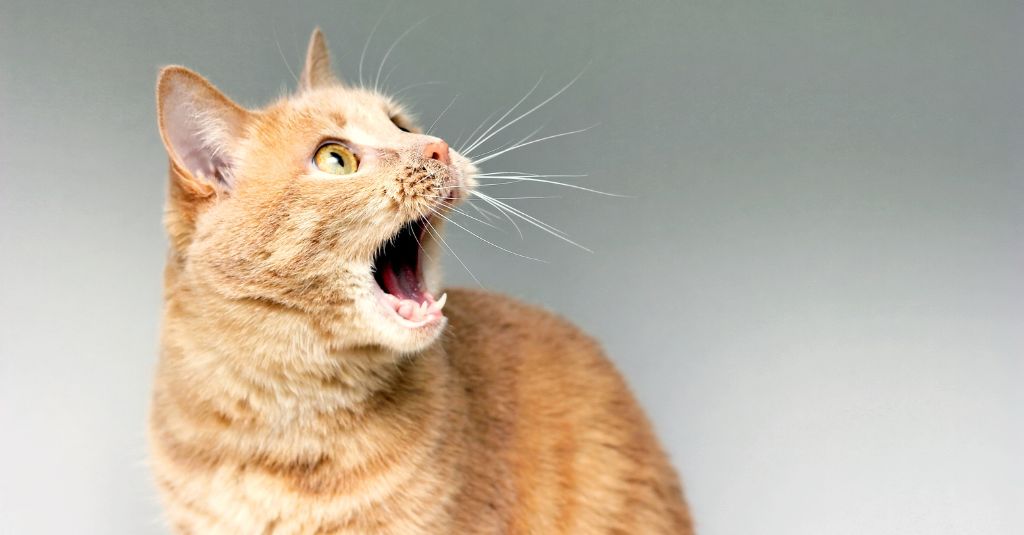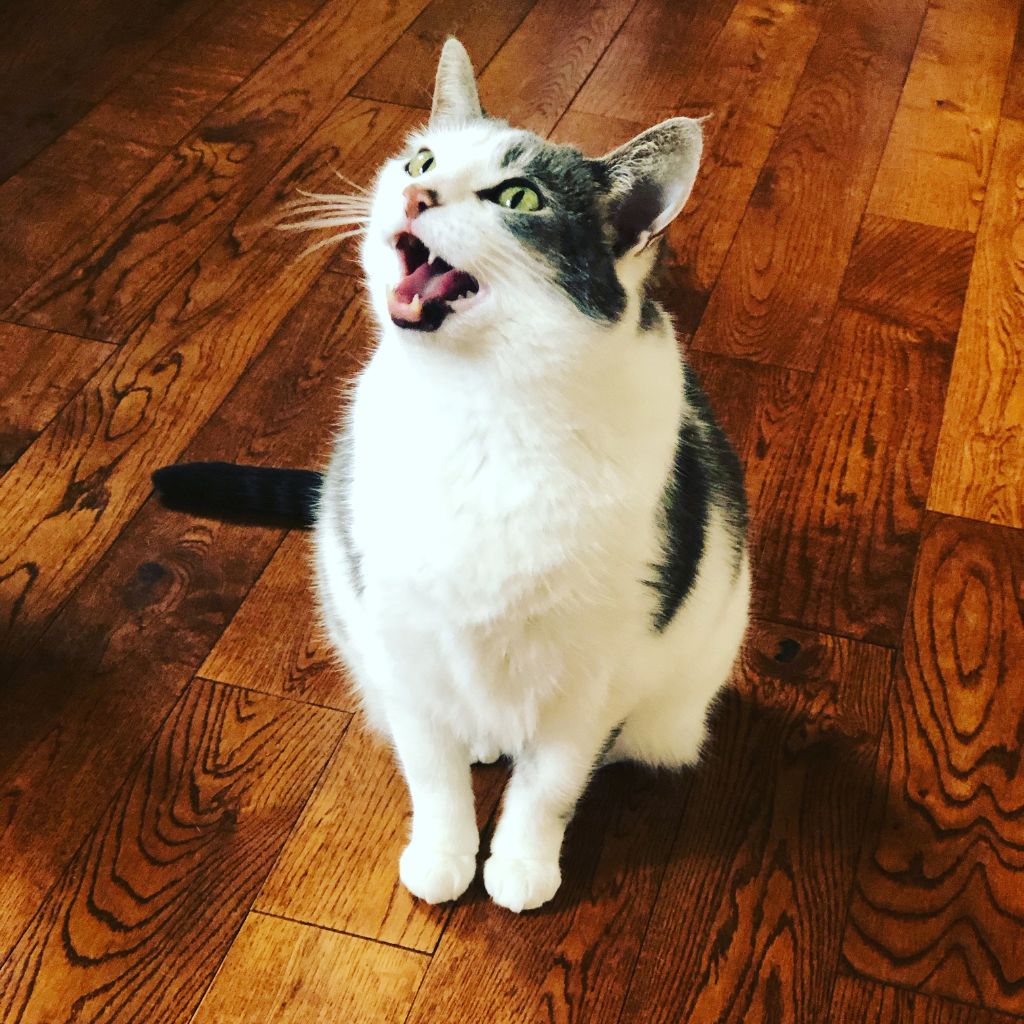stress & anxiety support

free shipping over $100 (USA & Canada)
1-877-937-4372 the pet expert hotline

Natural Help for Stress Reduction, Anxiety Relief, Behavioral Problems, and Aggression in Cats


Humans talk, whereas cats meow. Somewhere along the way, things are bound to be lost in translation, right? Communicating with your kitty is a great way to develop a stronger bond with your little one. But it goes beyond that. Understanding what your kitty is trying to tell you gives you an insight into their overall well-being and how you can help them live their best life.
Cats communicate in various ways, including body language, scent marking, and vocalizations. One of the most common sounds cats use to communicate with their human parents is meowing. Cats meow in response to several triggers! This well-known sound can mean a lot of things, from a request for attention or food to a sign of frustration, anxiety, or discomfort.
Understanding what your kitty is trying to tell you gives you an insight into their overall well-being.
With such a variety of meanings, how can you interpret your cat’s meow? Paying attention to your cat’s body language can help you better understand what they’re trying to say. The position of their tail and ears says a lot. What are they meowing at? And how often does this happen? For example, if you’ve noticed that your kitty usually meows at around mealtime every day, you know that’s a call for food.
The type of meow can also help you pinpoint the emotional response of your kitty. If your cat is making a series of short meows, they are most likely asking for attention or food. On the other hand, a long, drawn-out meow may indicate frustration, anxiety, or discomfort.
If your little one is meowing more than usual, consider investigating the root cause with your trusted veterinarian. Any changes to our pets’ behavior could be a sign that something is wrong.

How you respond to your furkiddo is just as important as understanding what they are trying to tell you. Reacting to signs of affection with positive reinforcement and love can help strengthen the bond between you and your little one. Some of these sounds are usually a good indication of your little one’s mood:
In the same way that you should react positively to sounds that show their happiness, approach your cat with patience, understanding, and compassion when they’re exhibiting signs of distress. Avoid punishing or scolding them, as this can worsen the situation and damage your relationship with your kitty. Instead, provide them with the support and care they need to feel safe and comfortable. If you hear any of these sounds, consider talking to your vet to help identify the underlying cause:
In cases of stress signals like different-sounding cats meow, aggressive hissing, or stress yowl, natural calming supplements can help. NHV’s holistic vet and master herbalist formulated NHV Matricalm specifically for kitties dealing with stress. You can also add NHV Lesstress to your little one’s regimen for those with excessive anxiety and aggressive behavior. These two supplements can help your cat to keep calm and relaxed naturally.
At NHV, our pet experts can help you understand what your feline kiddo is trying to tell you and recommend natural ways to help. Press the button below to chat with someone on our team. We are happy to help!
stress & anxiety support

Natural Support for Canine Stress and Anxiety
buy 2 and save $3
3 month supply for a small to medium size pet
Everyone knows what stress feels like, and we all know that too much stress can make us ill—high blood pressure, ulcers and even cancer can result from excessive stress. Like us, dogs can get stressed by numerous factors as well. Help your furkiddo relax into a long and happy life with NHV Lesstress - a natural dog stress support.


Everyone knows what stress feels like, and we all know that too much stress can make us ill—high blood pressure, ulcers and even cancer can result from excessive stress. Like us, dogs can get stressed by numerous factors as well. Help your furkiddo relax into a long and happy life with NHV Lesstress - a natural dog stress support.

Natural Dog Stress Reliever Supplemental Support
With a heightened sense of hearing and smell, small events that seem mundane to us can be terrifying and stressful for your dogs. Sometimes the stress is from the ride to the office, or maybe they are missing their human companions. This all contributes to changes in behavior like excessive panting, drooling, sweaty paws, dilated eyes, pacing, excessively shedding, or just completely shutting down. Some dogs become so stressed that it may lead to fear and aggression.
Other forms of stress in a dog’s life include:
In addition to panting, excessive barking/whining, chewing on themselves, shivering (when it’s not cold), panicked tail wagging, or tense muscles, stress can also cause GI tract issues such as diarrhea or vomiting.
The key to a healthy pup is balance. Too much or too little activity can be harmful, as well as too much or too little socialization. A balanced, clean diet also helps maintain the body and the mind. If your dog is susceptible to stress, you can use calming herbs like those found in NHV Lesstress. This formulation gently acts on the nervous system and immune system to provide a natural dog stress reliever.
How NHV’s Natural Dog Stress Relief Eases Stress and Anxiety
For stressful experiences such as separation anxiety, the loss or addition of a furry friend, special events (eg. fireworks) and illness (stress can cause conditions to worsen), the natural (non-addictive) sedative properties of Lesstress gently relax the nervous system and endocrine system. Ingredients like Chamomile, Passion Flower and Lemon Balm work to calm nerves while ingredients like Reishi, Eleuthero, and Echinacea Angustifolia are very beneficial for helping the body adapt to stress and illness and stimulate healthy immune function.
Help Support Your Dog Naturally
All NHV supplements like Lesstress are 100% natural and created by a holistic veterinarian and a master herbalist, specially formulated for pets. Feel free to contact our veterinary professionals to get more insight into your little one’s health and wellbeing.
Made with the finest, organically grown, or ethically harvested herbs. Made specifically for pets, vet-formulated and vet approved.
Lesstress for Dogs
Select your pet's weight to determine the correct dose.
To be taken twice daily. Determine your pet’s weight and then use the easy chart below to determine the correct dose. This is the minimum dosage.
Pet's Weight Dosage
0 - 15 lb = 0.5 ml
16 - 30 lb = 1.0 ml
31 - 45 lb = 1.5 ml
46 - 60 lb = 2.0 ml
61 - 75 lb = 2.5 ml
Over 75 lb = 3.0 ml
For small animals (rabbits, ferrets), avians and reptiles use 1 drop for every 2 lb of body weight.
How to Administer
Shake well before use.
The easiest method is to use the dropper provide and places the drops into your pet’s food or favorite treat. You can also use the dropper and squirt directly into the pet’s mouth.
Some pets can be finicky, if this occurs consider hiding the drops in foods most pet’s love such as fish, chicken or yogurt or a favourite treat. If your pet only eats dry food then soak a few kibbles at feeding time.
For Best Results
Herbal dietary supplements are beneficial to the health and wellbeing of your pet and are safe for long-term use. Every pet responds to natural herbal supplements differently, therefore it is important to be consistent and administer the product daily. Supplements generally take two to four weeks to take effect, however this will vary from one animal to the next.
Product Storage
All NHV Natural Pet Products are pure herbal extracts and contain no artificial additives, preservatives or coloring. Shelf life after opening is 6 months and must be refrigerated after opening.
Cautions and Contraindications
Do not use Lesstress in pregnant or nursing animals.
Speak to your vet before using our products. A second visit is recommended if your pet’s condition does not improve, or deteriorates after continued use of the supplements.
All information provided by NHV Natural Pet Products is for educational purposes only.
Natural Dog Stress Reliever Supplemental Support
With a heightened sense of hearing and smell, small events that seem mundane to us can be terrifying and stressful for your dogs. Sometimes the stress is from the ride to the office, or maybe they are missing their human companions. This all contributes to changes in behavior like excessive panting, drooling, sweaty paws, dilated eyes, pacing, excessively shedding, or just completely shutting down. Some dogs become so stressed that it may lead to fear and aggression.
Other forms of stress in a dog’s life include:
In addition to panting, excessive barking/whining, chewing on themselves, shivering (when it’s not cold), panicked tail wagging, or tense muscles, stress can also cause GI tract issues such as diarrhea or vomiting.
The key to a healthy pup is balance. Too much or too little activity can be harmful, as well as too much or too little socialization. A balanced, clean diet also helps maintain the body and the mind. If your dog is susceptible to stress, you can use calming herbs like those found in NHV Lesstress. This formulation gently acts on the nervous system and immune system to provide a natural dog stress reliever.
How NHV’s Natural Dog Stress Relief Eases Stress and Anxiety
For stressful experiences such as separation anxiety, the loss or addition of a furry friend, special events (eg. fireworks) and illness (stress can cause conditions to worsen), the natural (non-addictive) sedative properties of Lesstress gently relax the nervous system and endocrine system. Ingredients like Chamomile, Passion Flower and Lemon Balm work to calm nerves while ingredients like Reishi, Eleuthero, and Echinacea Angustifolia are very beneficial for helping the body adapt to stress and illness and stimulate healthy immune function.
Help Support Your Dog Naturally
All NHV supplements like Lesstress are 100% natural and created by a holistic veterinarian and a master herbalist, specially formulated for pets. Feel free to contact our veterinary professionals to get more insight into your little one’s health and wellbeing.
Made with the finest, organically grown, or ethically harvested herbs. Made specifically for pets, vet-formulated and vet approved.
Lesstress for Dogs
Select your pet's weight to determine the correct dose.
To be taken twice daily. Determine your pet’s weight and then use the easy chart below to determine the correct dose. This is the minimum dosage.
Pet's Weight Dosage
0 - 15 lb = 0.5 ml
16 - 30 lb = 1.0 ml
31 - 45 lb = 1.5 ml
46 - 60 lb = 2.0 ml
61 - 75 lb = 2.5 ml
Over 75 lb = 3.0 ml
For small animals (rabbits, ferrets), avians and reptiles use 1 drop for every 2 lb of body weight.
How to Administer
Shake well before use.
The easiest method is to use the dropper provide and places the drops into your pet’s food or favorite treat. You can also use the dropper and squirt directly into the pet’s mouth.
Some pets can be finicky, if this occurs consider hiding the drops in foods most pet’s love such as fish, chicken or yogurt or a favourite treat. If your pet only eats dry food then soak a few kibbles at feeding time.
For Best Results
Herbal dietary supplements are beneficial to the health and wellbeing of your pet and are safe for long-term use. Every pet responds to natural herbal supplements differently, therefore it is important to be consistent and administer the product daily. Supplements generally take two to four weeks to take effect, however this will vary from one animal to the next.
Product Storage
All NHV Natural Pet Products are pure herbal extracts and contain no artificial additives, preservatives or coloring. Shelf life after opening is 6 months and must be refrigerated after opening.
Cautions and Contraindications
Do not use Lesstress in pregnant or nursing animals.
Speak to your vet before using our products. A second visit is recommended if your pet’s condition does not improve, or deteriorates after continued use of the supplements.
All information provided by NHV Natural Pet Products is for educational purposes only.
general wellbeing

Newly adopted pets are often quite stressed. They have spent time in the shelter, removed from their previous home or even from time roaming the streets. Though they are happy to have found a forever home, all of these changes can be quite stressful and can cause some undesirable behaviors. Matricalm is an all-natural supplement designed to reduce anxiety, stress and undesirable behaviors in pets.
Newly adopted pets can often use nutritional support. Whether they are malnourished from being stray, not eating because of stress in the shelter or just adjusting to their new home, Multi Essentials can help to fill nutritional voids. This all-natural herbal multivitamin that can help to support your pet's health throughout their life.
Stress and anxiety can cause gastrointestinal upset. Plantaeris can help to soothe and relieve spasms of the digestive tract which may cause diarrhea. It works quickly and gently to help promote normal bowel function.
bundle and save with pet expert kits
3 month supply for a small to medium size
Newly adopted pets are often quite stressed. They have spent time in the shelter, removed from their previous home or even from time roaming the streets. This can lead to undesirable behavior and decreased appetite as they adjust to their new home. This blend of supplements can help your new pet's transition into their forever home be as stress-free and seamless as possible.

Newly adopted pets are often quite stressed. They have spent time in the shelter, removed from their previous home or even from time roaming the streets. This can lead to undesirable behavior and decreased appetite as they adjust to their new home. This blend of supplements can help your new pet's transition into their forever home be as stress-free and seamless as possible.
MATRICALM
Chamomile – Contains sedative properties.
Passion Flower – An effective, non-addictive sedative.
Lemon Balm – An aromatic herb used for nervous disorders, excitability, and anxiety.
Valerian – Stops heart palpitations, relaxes spasms, relieves discomfort, and regulates the nervous system.
Hops – Eases tension and anxiety in pets.
MULTI ESSENTIALS
Alfalfa – Contains high protein levels (50%), vitamins, amino acids, minerals, sugars, and other nutrients.
Oat – Contains gluten, vitamins, and minerals (Ca, P, Mn, Cu, Zn, Fe).
Dandelion– A highly nutritious food that stimulates liver secretions, improves digestion, and stimulates the appetite.
Kelp – Rich in macrominerals (Ca, K, Mg) and trace minerals.
Parsley – Contains protein (up to 22%), vitamins (A, C, B1, B2, K), and minerals (Ca, K, Fe, Mg, P).
Marshmallow – Contains high levels of Ca.
Chickweed – A highly nutritious digestive tonic.
Stinging Nettle – Contains vitamins, minerals, and other nutrients.
PLANTAERIS
Barberry – Treats inflammation and infections of the urinary tract.
Mullein – Soothes and lubricates tissues.
Bayberry – Contains tannins, resins, and gums that control bacterial infection.
Myrrh – Relieves spasms, inflammation, and digestive discomfort.
Thyme – Improves digestion and relaxes spasms.
Chamomile – Relaxes the digestive system.
Chinese Peony – Reduces inflammation and relaxes spasms.
Ginger – Relieves discomfort and stimulates circulation.
Oregon Grape – Helps relieve indigestion and malabsorption.
To be taken twice daily. (Each supplement) Determine your pet’s weight and then use the easy chart below to determine the correct dose. This is the minimum dosage.
Pet's Weight Dosage
0 - 15 lb = 0.5 ml
16 - 30 lb = 1.0 ml
31 - 45 lb = 1.5 ml
46 - 60 lb = 2.0 ml
61 - 75 lb = 2.5 ml
Over 75 lb = 3.0 ml
For small animals (rabbits, ferrets), avians and reptiles use 1 drop for every 2 lb of body weight.
Long term use: Feed recommended dosage every other day (1 day on 1 day off). If used in large dosages or over a long period of time it may become irritating to the stomach lining. Some pets may require a larger dosage due to their metabolism. You can safely double the recommended dosage.
How to Administer: Shake well before use. The easiest method is to use the dropper provided and place the drops into your pet’s food or favorite treat. You can also use the dropper and squirt directly into the pet’s mouth. Some pets can be finicky, if this occurs consider hiding the drops in foods most pet’s love such as fish, chicken or yogurt or a favourite treat. If your pet only eats dry food then soak a few kibbles at feeding time.
For Best Results: Herbal dietary supplements are beneficial to the health and well-being of your pet and are safe for long-term use. Every pet responds to natural herbal supplements differently, therefore it is important to be consistent and administer the product daily. Supplements generally take two to four weeks to take effect, however this will vary from one animal to the next.
Product Storage: All NHV Natural Pet Products are pure herbal extracts and contain no artificial additives, preservatives or coloring. Shelf life after opening is 6 months and must be refrigerated after opening.
Cautions and Contraindications: Do not use Yucca in pregnant or nursing animals. Allowing breaks in feeding helps alleviate the possibility of a irritating effect on the digestive tract. Speak to your vet before using our products. A second visit is recommended if your pet’s condition does not improve, or deteriorates after continued use of the supplements. All information provided by NHV Natural Pet Products is for educational purposes only.
Select your pet's weight to determine the correct dose.
This kit can absolutely help. The supplements were chosen for their support for anxiety.
This kit can help to support anxiety, nutrition and GI troubles. They are all safe to give if your pet has other conditions. Seek veterinary advice if you suspect your pet is unwell
Even if pets are over-all healthy, their bodies can be affected by stress. This kit would be a great way to keep your pet stress free and healthy when brought in to a new home
We recommend using this kit until your new pet happily settles into your home, generally we would expect for about 3 months.
MATRICALM
Chamomile – Contains sedative properties.
Passion Flower – An effective, non-addictive sedative.
Lemon Balm – An aromatic herb used for nervous disorders, excitability, and anxiety.
Valerian – Stops heart palpitations, relaxes spasms, relieves discomfort, and regulates the nervous system.
Hops – Eases tension and anxiety in pets.
MULTI ESSENTIALS
Alfalfa – Contains high protein levels (50%), vitamins, amino acids, minerals, sugars, and other nutrients.
Oat – Contains gluten, vitamins, and minerals (Ca, P, Mn, Cu, Zn, Fe).
Dandelion– A highly nutritious food that stimulates liver secretions, improves digestion, and stimulates the appetite.
Kelp – Rich in macrominerals (Ca, K, Mg) and trace minerals.
Parsley – Contains protein (up to 22%), vitamins (A, C, B1, B2, K), and minerals (Ca, K, Fe, Mg, P).
Marshmallow – Contains high levels of Ca.
Chickweed – A highly nutritious digestive tonic.
Stinging Nettle – Contains vitamins, minerals, and other nutrients.
PLANTAERIS
Barberry – Treats inflammation and infections of the urinary tract.
Mullein – Soothes and lubricates tissues.
Bayberry – Contains tannins, resins, and gums that control bacterial infection.
Myrrh – Relieves spasms, inflammation, and digestive discomfort.
Thyme – Improves digestion and relaxes spasms.
Chamomile – Relaxes the digestive system.
Chinese Peony – Reduces inflammation and relaxes spasms.
Ginger – Relieves discomfort and stimulates circulation.
Oregon Grape – Helps relieve indigestion and malabsorption.
To be taken twice daily. (Each supplement) Determine your pet’s weight and then use the easy chart below to determine the correct dose. This is the minimum dosage.
Pet's Weight Dosage
0 - 15 lb = 0.5 ml
16 - 30 lb = 1.0 ml
31 - 45 lb = 1.5 ml
46 - 60 lb = 2.0 ml
61 - 75 lb = 2.5 ml
Over 75 lb = 3.0 ml
For small animals (rabbits, ferrets), avians and reptiles use 1 drop for every 2 lb of body weight.
Long term use: Feed recommended dosage every other day (1 day on 1 day off). If used in large dosages or over a long period of time it may become irritating to the stomach lining. Some pets may require a larger dosage due to their metabolism. You can safely double the recommended dosage.
How to Administer: Shake well before use. The easiest method is to use the dropper provided and place the drops into your pet’s food or favorite treat. You can also use the dropper and squirt directly into the pet’s mouth. Some pets can be finicky, if this occurs consider hiding the drops in foods most pet’s love such as fish, chicken or yogurt or a favourite treat. If your pet only eats dry food then soak a few kibbles at feeding time.
For Best Results: Herbal dietary supplements are beneficial to the health and well-being of your pet and are safe for long-term use. Every pet responds to natural herbal supplements differently, therefore it is important to be consistent and administer the product daily. Supplements generally take two to four weeks to take effect, however this will vary from one animal to the next.
Product Storage: All NHV Natural Pet Products are pure herbal extracts and contain no artificial additives, preservatives or coloring. Shelf life after opening is 6 months and must be refrigerated after opening.
Cautions and Contraindications: Do not use Yucca in pregnant or nursing animals. Allowing breaks in feeding helps alleviate the possibility of a irritating effect on the digestive tract. Speak to your vet before using our products. A second visit is recommended if your pet’s condition does not improve, or deteriorates after continued use of the supplements. All information provided by NHV Natural Pet Products is for educational purposes only.
Select your pet's weight to determine the correct dose.
This kit can absolutely help. The supplements were chosen for their support for anxiety.
This kit can help to support anxiety, nutrition and GI troubles. They are all safe to give if your pet has other conditions. Seek veterinary advice if you suspect your pet is unwell
Even if pets are over-all healthy, their bodies can be affected by stress. This kit would be a great way to keep your pet stress free and healthy when brought in to a new home
We recommend using this kit until your new pet happily settles into your home, generally we would expect for about 3 months.
overall vitality

For Overall Health and Well-Being
buy 2 and save $3
An Omega 3 supplement for cats to support their joints, heart, eyes, immune system, and overall organ function.


An Omega 3 supplement for cats to support their joints, heart, eyes, immune system, and overall organ function.

Our cat omega 3 supplement is naturally made from the oils of sardines, anchovies, and North Atlantic cod. It’s an excellent source of EPA (Eicosapentaenoic Acid 600mg) and DHA (Docosahexaenoic acid 460mg) essential omega 3 fatty acids. It’s molecularly distilled and cold-pressed to improve the bioavailability
Support your cat with human-grade quality omega 3 fish oil supplements. Many processed pet foods are deficient in this important nutrient. And according to the University of Maryland Medical Center, "It is very important to maintain a balance between omega-3 and omega-6 fatty acids in the diet. A proper balance helps maintain and even improve health."
It’s important for cats to get essential fatty acids through their diet. This omega 3 supplement for cats will help keep them healthy, and even finicky cats actually like to take it.
Benefits of Cat omega 3 supplements:

Suggested Dosage: To be taken once per day. Add to food based on weight chart.
Therapeutic Dosage: Double the quantity for maximum period of 4 weeks or follow veterinarian advise.
Pet’s Weight Dosage
0-15 lb = ¼ tsp
15-30 lb = ½ tsp
30-60 lb = 1 tsp
60-90 lb = 1 ½ tsp
How to Administer: Shake well before use. The easiest method is to add the dosage to your pets food. Some pets can be finicky, if this occurs consider hiding the appropriate amount in food most pet’s love such as fish, chicken, yogurt, or a favorite treat. If your pet only eats dry food then soak kibbles at feeding time.
For Best Results
Dietary supplements are beneficial to the health and well-being of your pet and are safe for long-term use. Every pet responds to natural supplements differently, therefore it is important to be consistent and administer the product daily. Supplements generally take two to four weeks to take effect, however this will vary from one animal to the next.
Product Storage
All NHV Natural Pet Products contain no artificial additives, preservatives or coloring. Shelf life after opening is 6 months and must be refrigerated after opening.
Cautions and Contraindications
Avoid During Pregnancy.
Our cat omega 3 supplement is naturally made from the oils of sardines, anchovies, and North Atlantic cod. It’s an excellent source of EPA (Eicosapentaenoic Acid 600mg) and DHA (Docosahexaenoic acid 460mg) essential omega 3 fatty acids. It’s molecularly distilled and cold-pressed to improve the bioavailability
Support your cat with human-grade quality omega 3 fish oil supplements. Many processed pet foods are deficient in this important nutrient. And according to the University of Maryland Medical Center, "It is very important to maintain a balance between omega-3 and omega-6 fatty acids in the diet. A proper balance helps maintain and even improve health."
It’s important for cats to get essential fatty acids through their diet. This omega 3 supplement for cats will help keep them healthy, and even finicky cats actually like to take it.
Benefits of Cat omega 3 supplements:

Suggested Dosage: To be taken once per day. Add to food based on weight chart.
Therapeutic Dosage: Double the quantity for maximum period of 4 weeks or follow veterinarian advise.
Pet’s Weight Dosage
0-15 lb = ¼ tsp
15-30 lb = ½ tsp
30-60 lb = 1 tsp
60-90 lb = 1 ½ tsp
How to Administer: Shake well before use. The easiest method is to add the dosage to your pets food. Some pets can be finicky, if this occurs consider hiding the appropriate amount in food most pet’s love such as fish, chicken, yogurt, or a favorite treat. If your pet only eats dry food then soak kibbles at feeding time.
For Best Results
Dietary supplements are beneficial to the health and well-being of your pet and are safe for long-term use. Every pet responds to natural supplements differently, therefore it is important to be consistent and administer the product daily. Supplements generally take two to four weeks to take effect, however this will vary from one animal to the next.
Product Storage
All NHV Natural Pet Products contain no artificial additives, preservatives or coloring. Shelf life after opening is 6 months and must be refrigerated after opening.
Cautions and Contraindications
Avoid During Pregnancy.
Published: May 15, 2023